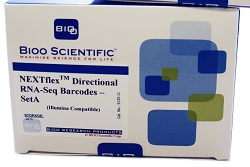AN EASY, flexible, and non-biased method to generate directional single, paired-end, and multiplexed libraries from mRNA- or rRNA-depleted total RNA is promised by Bioo Scientific for its NextFlex kits.
Bi-directional sequencing, in both the 5′-3′ and the 3’5′ directions, means that the NextFlex directional RNA-seq kit provides thorough and even coverage of long RNAs, says the company.
The kits fragment mRNA (or rRNA-depleted RNA) using a cationic buffer. This fragmented RNA is dephosphorylated, followed by a kinase treatment which adds a 5′ phosphate.
Fragmented RNA now containing 5′ phosphate and 3′ hydroxyl groups are then ligated to randomised 3′ and 5′ adapters, followed by first strand synthesis and amplification.
Bi-directional sequencing can be performed on the same sample by using barcodes to differentiate the different reads.
While ligation based adapter addition is a hallmark of most NGS library preparations, it is well known that ligases can introduce sequence dependent bias, an un-desirable side effect.
Bioo Scientific says its randomisation technology incoproates mixed bases at the ends of the adapter, eliminating ligase preference and its resulting bias.
This technology is available in both NextFlex Randomised Adapter and NextFlex Randomised Reverse Adapters Sets.

